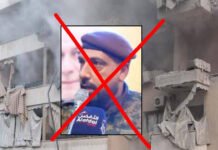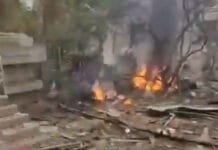Jerusalem/Beirut, October 23, 2025:
Tensions in the Middle East surged again on Thursday as Israel launched a fresh wave of airstrikes targeting Hezbollah positions in southern Lebanon, triggering fears of a full-scale regional war. The Israel Defense Forces (IDF) confirmed that the operation was a “defensive response” to rocket barrages launched by Hezbollah overnight.
According to Lebanese media, at least 34 people, including civilians, were killed when missiles struck multiple locations near Tyre and Bint Jbeil. Israel said its strikes were aimed at “rocket storage sites and command centers,” accusing Hezbollah of escalating attacks from Lebanese soil.
“Israel will defend itself against any terrorist aggression,” Israeli Prime Minister Benjamin Netanyahu said in a televised statement. “We will not allow Iran-backed forces to open another front against our people.”
The statement came hours after Hezbollah’s leader, Hassan Nasrallah, warned that “the era of silence is over,” vowing retaliation for Israeli actions in Gaza and along the northern frontier.
⚔️ Background: A Dangerous Escalation
The latest confrontation marks one of the most serious escalations since the 2006 Israel–Hezbollah war, raising concerns across diplomatic circles. The border skirmishes, which began earlier this month, have intensified amid the ongoing Israel–Hamas war in Gaza, drawing the region toward a potential multi-front crisis.
Military analysts say Hezbollah’s recent show of strength—launching more than 150 rockets in a single day—signals a coordinated effort to pressure Israel amid international criticism of its Gaza operations.
“This isn’t just about Lebanon anymore,” said Dr. Leila Mansour, a regional expert at the American University of Beirut. “What we are seeing is a regional message—Hezbollah testing red lines and Israel showing it’s ready to go all in.”
🌍 Global Reaction: Calls for Calm
The United Nations Security Council held an emergency session late Wednesday, urging both sides to de-escalate immediately. UN Secretary-General António Guterres said he was “deeply alarmed” by the situation and warned that “one miscalculation could ignite a wider regional war.”
The United States and France have called for restraint, with U.S. Secretary of State Antony Blinken engaging in back-channel diplomacy with both Jerusalem and Beirut. Meanwhile, Iran, a key backer of Hezbollah, condemned the Israeli strikes as “state terrorism,” further complicating efforts for peace.
💣 Humanitarian Impact Mounts
Lebanese officials report that more than 10,000 residents have fled villages near the southern border in the past week. Local hospitals, already stretched thin by fuel shortages, are struggling to treat casualties. Aid organizations have appealed for international assistance.
“The humanitarian toll is growing every hour,” said UNICEF regional spokesperson Rana Haddad. “Children and families are being forced from their homes with nowhere safe to go.”
⚖️ What’s Next?
With both Israel and Hezbollah standing firm, analysts fear that the next 48 hours could prove critical. If the rocket fire continues, Israel may consider a ground operation in southern Lebanon—a move that could engulf the region in a full-blown war.
Despite international mediation efforts, neither side appears willing to back down. As one Israeli defense official told local media, “We are not looking for war, but we are fully prepared for one.”
📈 Conclusion: World Watches in Unease
The Israel–Hezbollah standoff has become the world’s latest flashpoint, sending shockwaves through oil markets and diplomatic corridors alike. While global leaders push for peace, the possibility of a widening Middle East war looms dangerously close.
















